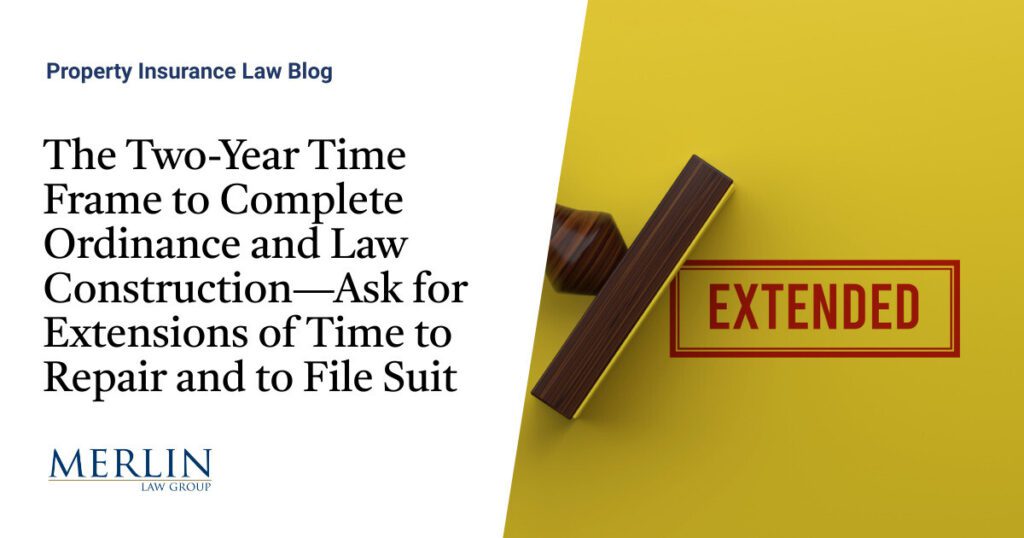The Two-Year Time Frame to Complete Ordinance and Law Construction—Ask for Extensions of Time to Repair and to File Suit

Some insurers and their attorneys will do anything to avoid paying coverage otherwise owed. The two-year limitation to complete construction in the Ordinance and Law coverage is one such arbitrary time limitation, and some insurers and their insurance defense attorneys love to claim a technical “win” simply because they delayed the matter for so long that they escape payments otherwise owed.
Empire Indemnity and its attorneys were successful in this strategy in a recent case. 1 The Association explained its predicament in a brief as follows:
Cresthaven’s residents are comprised primarily of elderly retirees, who paid Empire handsomely in exchange for a promise that Empire would pay specified damages in the event of a loss. While Empire was more than happy to accept the retirees’ money, faced with a covered multi-million-dollar loss, Empire has broken both its contractual promises and those made after loss to both Cresthaven and the courts to avoid honoring its bargain.
Initially, a mediated settlement resulted in Empire waiving temporal limitations in order facilitate appraisal of the loss. Despite this agreement, Empire used waived temporal defenses to extend litigation for years, then dropped those defenses in order to avoid trial and secure a dismissal. Once the time limitations provided by Fla. Stat. § 95.11(2)(e) 1 had (allegedly) run, Empire did an about-face and raised a temporal defense to avoid making millions of dollars’ worth of payments now owed to Cresthaven.
In its Answer Brief, Empire all but admits that this was the scheme all along. The district court unfortunately permitted Empire to abuse the federal judicial system in this manner….
Empire Indemnity won because the five-year time limit to file a lawsuit passed. The policyholder did not get an agreed extension to file suit and did not file suit in the five years. The insurer certainly did not pay the full amount on time, and it certainly won on a technicality of time, which all policyholders should be concerned about as soon as an insurer does not pay in a timely manner.
Technicalities matter, and the appellate court ruled in favor of the insurer:
We agree with the district court. Cresthaven points to no actual evidence, and our careful review of the record reveals little or no evidence, to support Cresthaven’s bald assertion that Empire never intended to consider and adjust in good faith Cresthaven’s OLC claim in light of the Policy provisions and the law. As noted above, the district court’s adoption of crucial policy provision interpretations proffered by Empire belies any notion that Empire’s positions taken during its consideration of Cresthaven’s claim were anything other than a good faith evaluation of the claim in light of the Policy provisions and the law. And, as also noted above, Empire’s July 8, 2022, letter in effect invited Cresthaven to complete repairs and submit requests for payment. The fact that Empire did invoke the five-year statute of repose after its expiration merely indicates that Empire intended to exercise its rights under the Policy provisions and the law, which intention was apparent from the very inception of Cresthaven’s claim. As also noted above, Empire’s waiver of two very specific rights is not a basis on which to infer a waiver of all rights.
Good insurance companies pay despite technicalities. Agents and policyholders should note who the insurance companies that they deal with are, including the attorneys who the insurance company retains. Policyholders and their agents should avoid companies like Empire Indemnity because, while technically and legally correct, who wants to deal with these types?
The other lesson is to ask for extensions and file lawsuits to protect the time to enforce rights. This is especially important with the two-year time limitation for law and ordinance coverage.
Thought For The Day
Goals aren’t enough. You need goals plus deadlines: goals big enough to get excited about and deadline to make you run. One isn’t much good without the other, but together they can be tremendous.
—Zig Ziglar
1 Cresthaven Ashley Master Assoc. v. Empire Indem. Ins. Co., No. 23-12761, 2024 WL 3690863 (11th Cir. Aug. 7, 2024).



